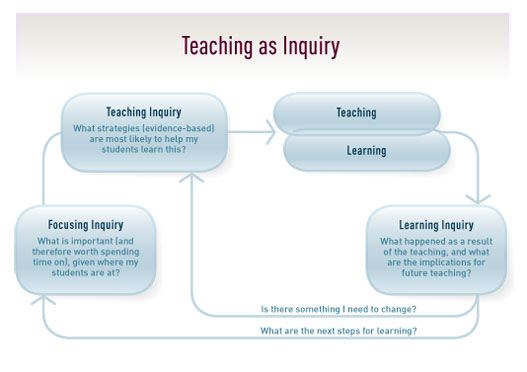 Image via Wikipedia
Image via WikipediaChristina Ward facilitated a webinar today - 23rd November (access recording here), which explored the topic of teaching as inquiry. A record number of people registered for the session, and even before the session got underway there was some good discussion in the text chat box. Christina, since 2004, has been linked up with the curriculum development team within the Ministry of Education (MoE), and since then she has been working on the NZ curriculum online.
The session started with Christina sharing a quotation by Stoll, Fink & Earl (2003): "Teachers are at the heart of school improvement, and with all the change in the world and new understandings about learning it is essential that they too keep learning". Christina stressed that it is important to have teachers at the heart - and thinking about learning. During the session Christina planned to give a quick look at teaching as inquiry and its place in the NZC, as well as characteristics of schools and classrooms where teaching as inquiry is evident along with some examples.
Christina started with a short survey that asked participants to rate their experience about teaching as inquiry. The results were really interesting with 20% of participants just beginning to learn about teaching as inquiry, 40% who have made a start and are noticing shifts, 30% who are confidently using teaching as inquiry, and 1-% who have a deep understanding and notice significant shifts in student achievement and teaching practice.
The teaching as inquiry cycle was then discussed, along with a clarification that inquiry learning and teaching as inquiry are different things. The teaching as inquiry approach has been developed to encourage teachers to inquire into their own teaching methods, assess its effectiveness, and learn or alter practices where necessary. Christina provided a really useful link to the Instep site that provides some great ideas of different ways that inquiry can happen, and it also explains some of the key terminology.
 Image via Wikipedia
Image via WikipediaParticipants were asked to watch this video where Helen Timperley, Professor of Education at The University of Auckland talks about ways teachers can gain knowledge through cycles of inquiry into their practice. There was also a link to a report written by Helen Timperley that covers the subject of PD in depth and what is proving effective.
The characteristics of schools who are showing that they have a pretty strong handle on teaching as inquiry include support for teachers with:
- systems and processes for introducing teaching as inquiry
- promote a culture of trust and open mindedness
- allow for fallibility
- encourage persistence
- meeting in groups to understand processes and put them into practice
- investigate data
 Image by Mamboman1 via FlickrIn schools where inquiry teaching is encouraged the dialogues around teaching and learning have been seen to have changed, and this has proven healthy in whole schools shifts. A couple of participants mentioned aspects of teaching as inquiry in their institutions including: "We had teaching as inquiry projects as part of our appraisal process", although others mentioned "Some teachers use avoidance tactics such as this is an add on rather then it is something that we do every day in our teaching ", and "Often senior managers see it as an add on and a tick box exercise to keep ERO happy".
Image by Mamboman1 via FlickrIn schools where inquiry teaching is encouraged the dialogues around teaching and learning have been seen to have changed, and this has proven healthy in whole schools shifts. A couple of participants mentioned aspects of teaching as inquiry in their institutions including: "We had teaching as inquiry projects as part of our appraisal process", although others mentioned "Some teachers use avoidance tactics such as this is an add on rather then it is something that we do every day in our teaching ", and "Often senior managers see it as an add on and a tick box exercise to keep ERO happy".On the example front, Christina shared some awesome resources including the following videos:
- Developing school-wide inquiry (Newmarket Primary School)
- Accelerating Māori and Pasifika students (Newmarket Primary School)
- Effective pedagogy at Ilam School
- Deprivatising practice: In this story Gary Punler describes how teaching practice in his school is no longer personal and private to the teacher concerned.
 Image by gorbould via Flickr
Image by gorbould via FlickrAnd an article in .pdf format entitled Teaching as Inquiry: One School's Approach. Participants were able to pick and choose a resource that was relevant to them, go away to access / watch it, and then return to the Webinar...with comments. Some of the comments included:
- "I love the idea of ‘de-privatizing’ learning. The importance of collaborative discussion of one anothers practice- It requires a very positive, encouraging environment for teachers to share so openly."
- "Carol jarrett's comment about reframing the learngin conversation between teachers to look at problems of practice in a positive way so they can feel safe to try new things very very important"
- "principals/leaders to model the inquiry is indeed powerful"
- "Good to see the work being done in pastoral component with secondary school. It would be interesting to see the research"
- "As DP I'm inquiring into eportfolios"
- "Carol Jarrett's video says interesting things about taking those risks"
 Image by m-c via Flickr
Image by m-c via Flickr






No comments:
Post a Comment